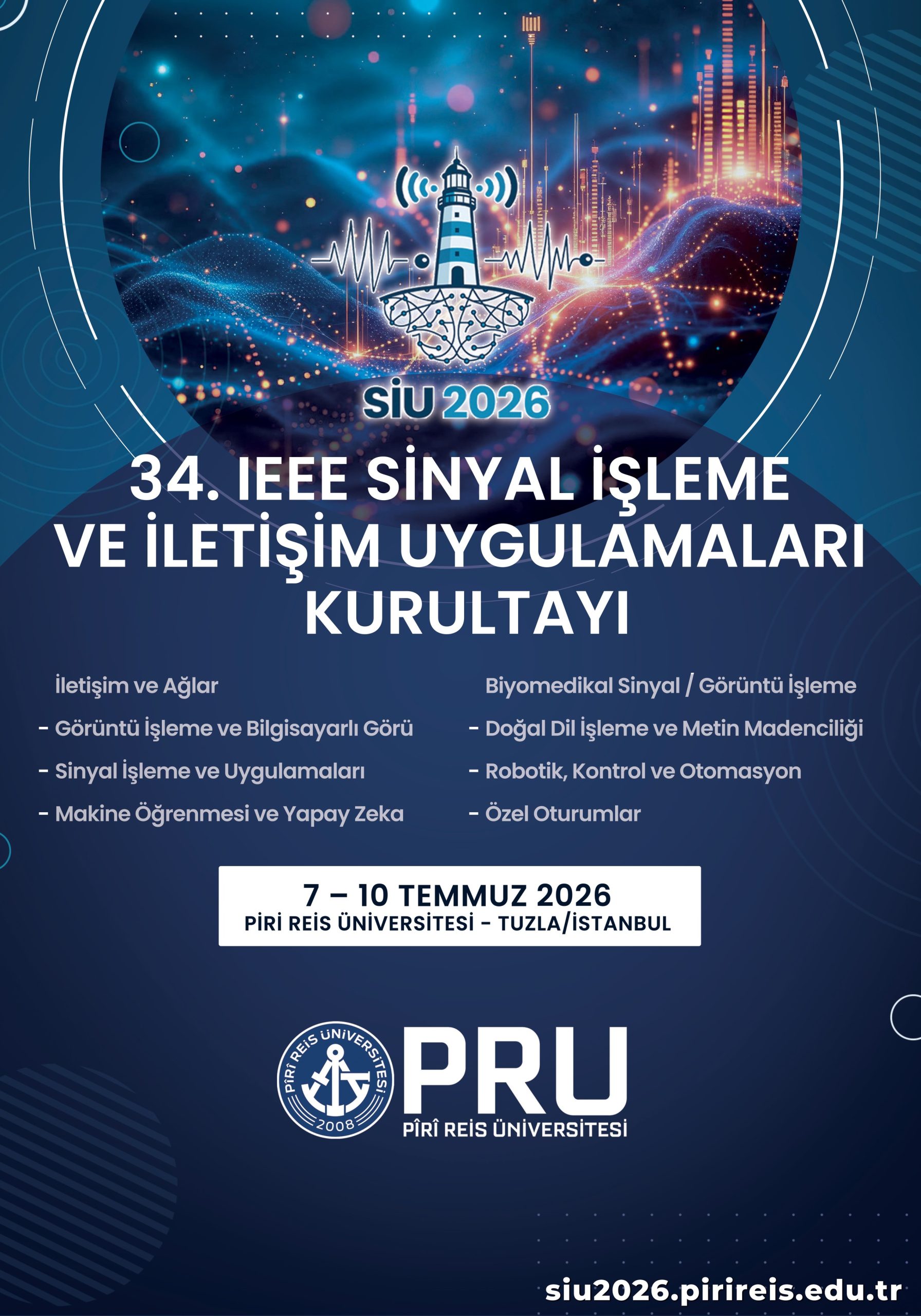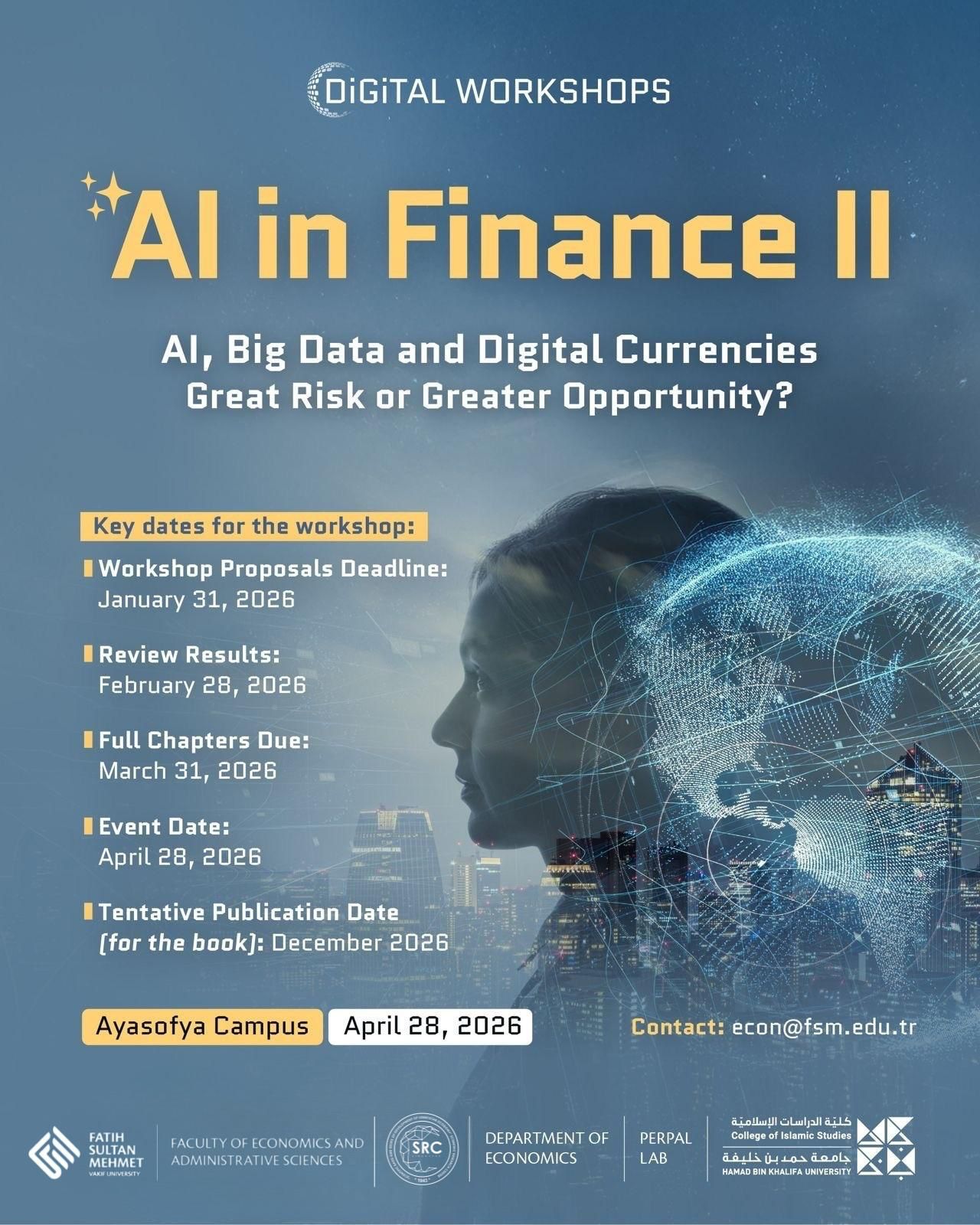AI in Energy and Economics:
Security issues, Risks, Regulations, Opportunities and Challenges
Jointly organized by Fatih Sultan Mehmet Vakif University (Türkiye), Ibn Haldun University (Türkiye), Tashkent State University of Economics (Uzbekistan) and Ahmet Yassawi University (Kazakhstan)
The workshop (jointly organized by PERPAL - FSMVU, HACE - IHU, CEDR - TSUE and ERI - AYU) aims to provide an environment and a new platform to discuss recent trends in digitalization, AI and machine learning, contemporary business practices and technological developments in energy and economics. It provides a new platform to discuss, exchange ideas and learn about the latest developments related to AI-driven decision-making in energy, security issues and regulations as well as the broader digital and AI transformation. Challenges, risks and opportunities will also be discussed in detail.
In an era of innumerable innovations, rising trend of uncertainties and countless efforts to build new standards, the drivers behind this rapid and impressive developments are also of major curiosity. Relatively dynamic vanguard of innovations, cutting edge solutions and more efficient payment and transfer systems, different opinions, expectations, the latest trends in research in all these new fields will be examined thoroughly.
The workshop provides a new opportunity to discuss, learn and even shape the future of digitalization. The goal, hence, is to provide a space for open and active discussions about issues surrounding digital and AI transformation. The workshop aims to bring together different opinions, expectations, cutting-edge research in these new fields.
Topics (though not limited to):
The following topics shall form the core structure of the workshop:
- AI in Energy and Economics: AI-powered decision-making and applications in energy,
- Energy efficiency,
- Digital governance,
- AI in public policies,
- Digital energy and AI,
- Financial technologies,
- Sustainable digital transformation,
- Payment Services
- Payment Gateways & Orchestration
- Green Finance in energy sector,
- Industry 4.0, Industry 5.0 and Industry 6.0
- Sustainable digital transformation
- Digitalization in public policies,
- AI in public policies,
- Digital energy and AI,
- FinTech in Public Institutions,
- Artificial Intelligence,
- Generative AI,
- Machine learning,
- AI based modelling,
- Deep learning,
- Cognitive computing,
- AI and future,
- AI and its applications in energy,
- Big Data,
- Better use of data,
- Data analytics,
- AI and data analytics
- AI and data centers,
- Security, Risks and Challenges: Security issues, risks and challenges associated with AI adoption in energy sector and decision-making processes
- Disruptions to the Markets, Production or Work,
- Systemic risk
- Efficiency
- Trust
- Fairness
- Privacy
- Security
- Changing mindset
- AI at a crossroad – opportunities, risks, and the path forward,
- Ethical implications of AI: AI ethics and bias mitigation could help further promote responsible and fair AI. Ethical considerations include:
- AI and ethics
- Ethical and regulatory issues
- Ethical AI and responsible AI
- Potential ethical dilemmas posed by AI
- Responsible innovation and ethical accountability
- Regulatory issues: Regulations surrounding artificial intelligence applications in energy
- AI governance
- AI regulations in energy and economics
- Regulatory frameworks
- Data protection laws
- Anti-money laundering measures
- Fraud detection
- Technology and regulation interaction
- Elaborating on the role of regulation in AI and digitalization,
- AI governance
- A future-focused concluding chapter: Discussing emerging trends, potential future applications of AI in energy,
- Potential future applications,
- Future Trends and Strategic Implications
- Building Resilient, AI-Ready Organizations
- What’s Next: A Practical Guide for Leaders
Other key topics:
- Investment structures, risk profiles, capital flows and financial impacts of the energy transition
- Volatility and Uncertainty in Energy Pricing
- Technology, Innovation, and Financial Disruptions
- Energy Security and Market Regulations
- Price Volatility, Risk Management and Uncertainty
- Energy Price Dynamics
- Carbon Trading and Green Finance
- Digital Infrastructure and Smart Grids
- Blockchain and Cryptocurrency Applications
- Real-Time Data Analytics and AI Trading
- Digital Twin Technology
- Cybersecurity in Energy Markets
- Smart Contracts and Automated Trading
- Decentralized Energy Systems
- Post-Pandemic Accelerating Digital Transformation
- Digital Globalization
- AI and its applications in Energy and Economics
- Digital supply networks
Event details:
Workshop location: Ayasofya Campus, FSMVU
Date of event: February 28, 2026
Key dates for the workshop:
- Workshop Proposals Deadline: December 31, 2025
- Review Results: January 10, 2026
- Full Chapters Due: February 10, 2026
- Event date: February 28, 2026
- Tentative Publication Date (for the book): Fall 2026
Workshop policies:
A book (from one of the leading international publication houses) will be published out of the workshop submissions (in progress).
No submission or publication fee is required for the authors.
Please do not hesitate to get in touch with us, if you have any questions.
We look forward to hosting and working with the distinguished faculty focusing on these topics.
PERPAL Lab
Econ Department, FEAS, FSMVU
Contact info:
Bilal Bağış, Assoc. Prof.
Etkinlik Türü : Çalıştay
Konum : Ayasofya Campus
Saat : 10:30





